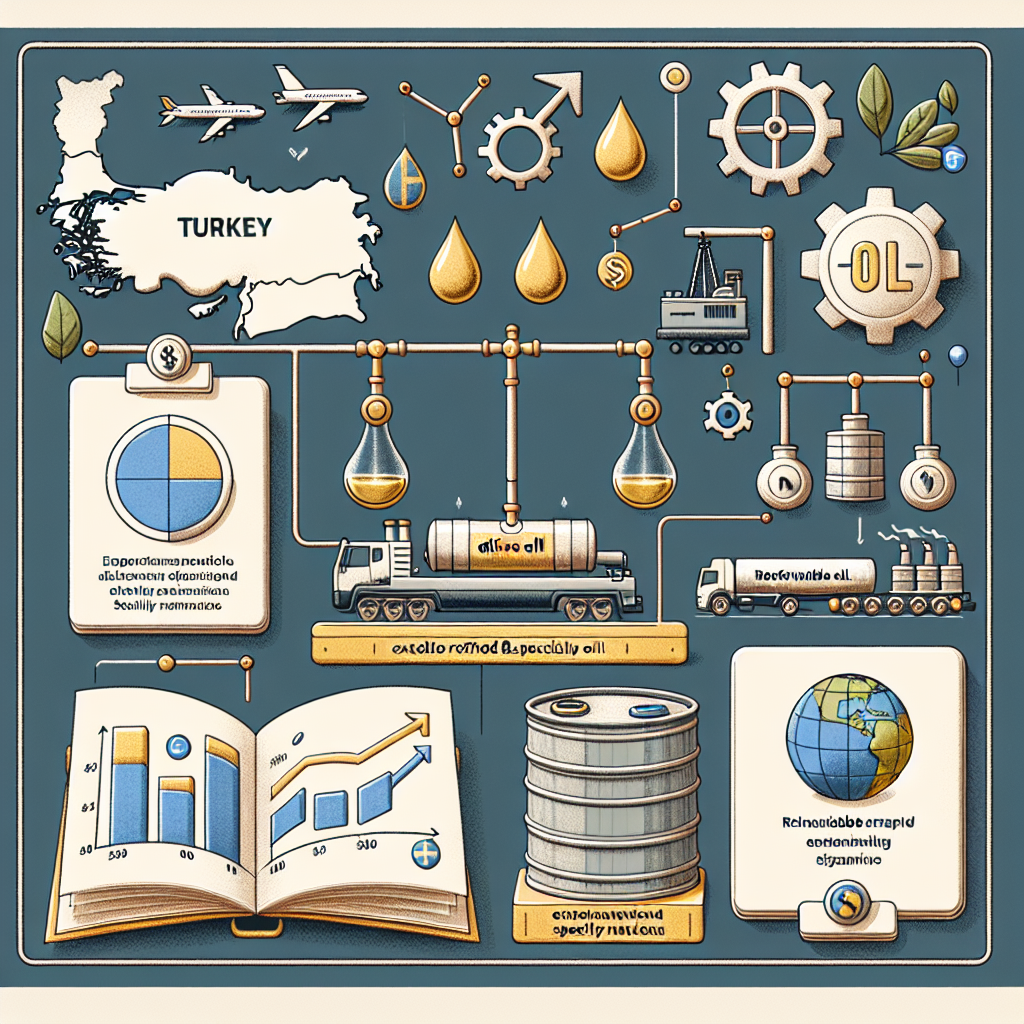“Sweden-Turkey Oil Trade: Key Insights and Market Dynamics”

Dynamic Import and Export Analysis Report
Executive Summary
This report presents an extensive analysis of the import and export activities of oil between Turkey and Sweden. The analysis encompasses the production capacities, compliance with quality standards, competitive pricing, market demand, key target markets, and prevailing trade trends.
Highlights
- Main Product: Oil
- Source Country: Turkey
- Destination Country: Sweden
- Language: English
- Metrics: Import/export values, market dynamics, regulatory environment, and strategic recommendations.
Detailed Analysis
Section A: Import Analysis for Sweden
1. Overview of Imported Products
Sweden imports various categories of oil, including crude oil, refined petroleum, and specialty oils. The major types imported include:
- Crude Oil: Essential for refining and creating derivatives such as gasoline and diesel.
- Refined Petroleum: Used in a wide range of industries, including transportation and manufacturing.
2. Reasons for Importing
Sweden relies on oil imports due to insufficient domestic production to meet national demand, and to benefit from competitive international pricing.
3. Import Values (USD)
- Crude Oil Imports: Approx. $5 billion annually.
- Refined Petroleum Imports: Approx. $2 billion annually.
4. Supplier Countries
- Turkey: Significant importer of refined oil products.
- Other Key Suppliers: Russia, Norway, the UK.
Section B: Export Analysis for Turkey
1. Overview of Exported Products
Turkey exports an array of oil-based products, prominently including:
- Refined Petroleum: Produced in high-capacity refineries for international markets.
- Specialty Oils: Used in industrial applications.
2. Reasons for Exporting
Turkey leverages its strategic geographic location and advanced refining capabilities to cater to growing international demand.
3. Export Values (USD)
- Refined Petroleum Exports: More than $10 billion annually.
- Specialty Oils Exports: Approx. $1 billion annually.
4. Primary Target Markets
- Sweden: Significant importer due to consistent demand for high-quality oil.
- Additional Markets: EU countries, Middle East nations.
Market Dynamics and Trends
Current Market Dynamics
- Global Oil Prices: Fluctuations impact both import and export values.
- Energy Policies: Renewable energy initiatives in both countries affecting oil demand.
Trend Analysis
- Graphical Representations: Figures indicating peak import/export months, price trends (historical data indicating yearly trends).
- Technology Influence: Advances in oil extraction and refining impacting market supply chains.
Regulatory and Strategic Framework
Regulatory Environment
- Turkey: Compliance with international quality standards, environmental regulations.
- Sweden: Adhering to EU’s strict environmental policies and import regulations.
Strategic Considerations
- Logistics: Evaluating shipping routes, storage facilities.
- Tariff Impacts: Tariffs levied on certain oil products affecting cost structures.
- Trade Agreements: Existing and prospective deals enhancing trade efficiency.
Strategic Recommendations and Conclusion
Insights
Oil remains crucial for Sweden’s energy sector and Turkey’s export economy. Compliance with regulations while optimizing logistics ensures cost-effective trade.
Recommendations
- Leverage Trade Agreements: Maximize benefits from existing and new trade deals to reduce tariffs and improve market access.
- Invest in Refining Technology: Enhance Turkey’s refining capacities to produce higher quality oil, thus increasing export value.
- Sustainability Initiatives: Both countries should invest in sustainable energy solutions to balance the economic dependence on oil trade.
Forward-Looking Strategies
- Market Diversification: Explore new markets beyond the traditional ones to hedge against demand fluctuations.
- Strategic Alliances: Form partnerships to ensure stable oil supply chains and market intelligence sharing.
Note: This report will be automatically translated into the specified language if it differs from English, ensuring comprehensive understanding for diverse stakeholders. Implementing this in automated reporting tools will enable real-time, dynamic analysis and contribute to informed decision-making.
Usage Tip: Utilize this report template to generate in-depth market insights for varied products and countries, adapting dynamically to the input data to maintain accurate, updated analyses.

